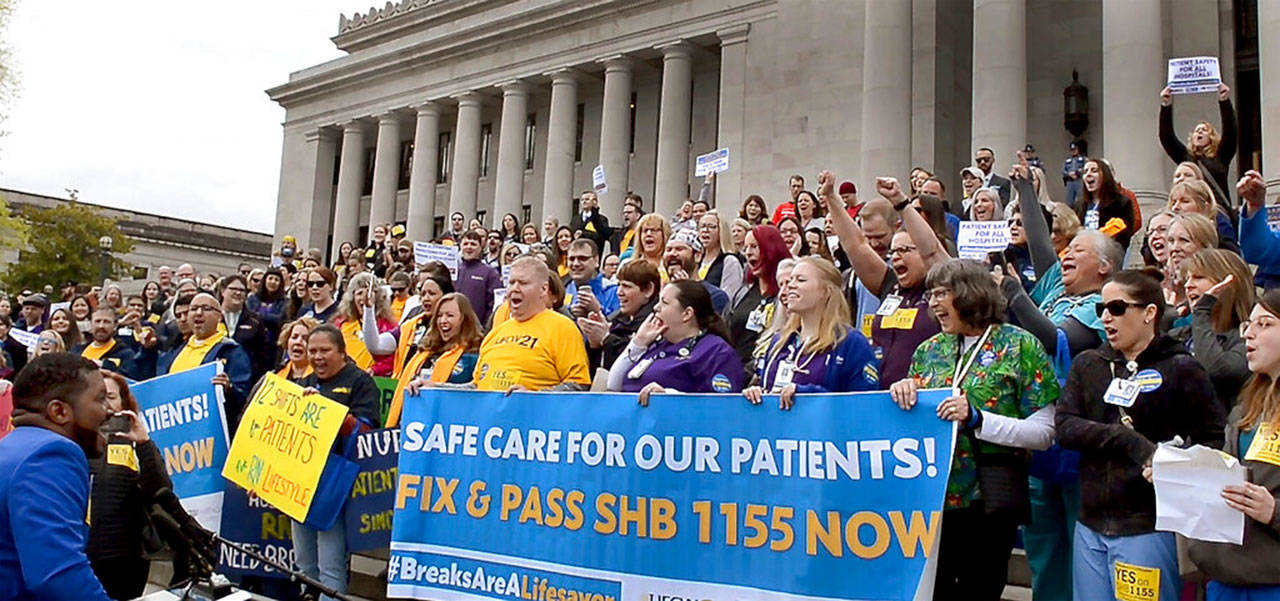By The Herald Editorial Board
State Sen. Maureen Walsh, R-College Place — in her apology to nurses for her crack that they didn’t need guaranteed breaks because some probably spent part of their day playing cards — made the point nurses have been making for years.
Walsh dealt her card-playing aside while arguing to exempt smaller rural hospitals from legislation mandating uninterrupted breaks for nursing staff. The comment quickly earned her nationwide attention and rolling eyes from nurses who work long hours in a demanding profession.
Walsh, in her apology, tried to explain the comment, while continuing to defend her amendment:
“I was tired, and in the heat of argument on the Senate floor, I said some things about nurses that were taken out of context, but still they crossed the line,” Walsh said in a statement Monday. “I really don’t believe nurses at our critical access hospitals spend their days playing cards, but I did say it, and I wish I could reel it back.”
Yes, senator, fatigue often is a factor in mental mistakes and accidents, whether it’s medical staff or lawmakers who are working long hours.
And it’s why the legislation was necessary and is now on its way to the governor’s desk: The size of a hospital and the type of community it serves should make no difference in the quality of care provided, which requires that health care workers at all health care facilities have adequate opportunity for meals and rest during shifts that can last 12 hours and longer.
The legislation, HB 1155, will require mandatory and uninterrupted meal and rest breaks at all hospitals, except in emergency situations or where a negative outcome to patient care might occur. If a rest break is interrupted, an additional 10-minute break must be provided.
Walsh’s amendment, which exempted the smaller rural facilities designated as Critical Access Hospitals, was adopted as part of the bill that passed the Senate. But House and Senate lawmakers in a conference committee restored the requirement for hospitals with fewer than 25 beds but allowed them two additional years to comply.
However, the argument that smaller rural hospitals face tighter finances than their larger urban counterparts shouldn’t be dismissed. Economies of scale, for example, mean it’s easier for larger hospitals to provide the level of staffing necessary to allow adequate rest breaks.
The nursing shortage in Washington state has eased; projections five years ago that Washington state could face a shortage of 7,000 nurses have now become a surplus of 6,200 nurses in the state by 2030, according to a 2017 report by the federal Health Resources and Services Administration. Yet rural hospitals and health care facilities still face difficulties in offering the level of pay and benefits that can attract nurses to smaller communities.
Rural hospitals — with patient populations that are poorer, older and sicker — typically provide care to a larger percentage of Medicaid and Medicare patients as well as uninsured patients. The revenue from federal and state reimbursements typically is lower than that of private insurance. A 2016 report on rural hospital finances found that about 41 percent of U.S. rural hospitals had operating margins in the red, including at least 12 in Washington state.
A related example: The low rate for Medicaid reimbursement, which is set by the state, is resulting in a crisis for the state’s nursing homes, wrote Robin Dale, president and CEO for the Washington Health Care Association, for The Herald in March.
Some nursing homes, Dale warned, face daily costs for the care of Medicaid patients that average more than $40 higher than what is reimbursed, with the result that some facilities face closure.
“In the last two years alone, about a dozen facilities in the state have closed, totaling a loss of nearly 700 nursing home beds,” he wrote.
Patients in hospitals, nursing homes and other health care facilities should expect a level of care that delivers the best opportunity for good health. That treatment requires adequate funding.
Had Sen. Walsh played her cards right, she could have brought attention to the inadequate funding of the state and federal system of health care coverage, rather than on the breaks that nurses deserve and that good patient care requires.
Talk to us
> Give us your news tips.
> Send us a letter to the editor.
> More Herald contact information.

























